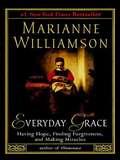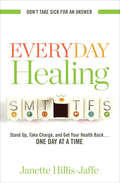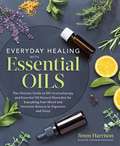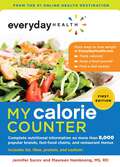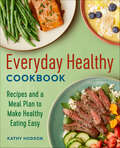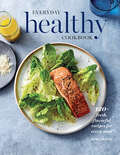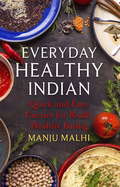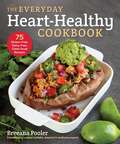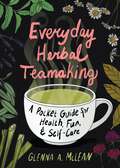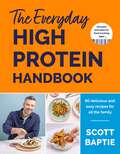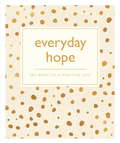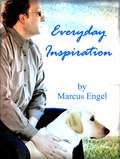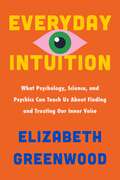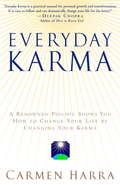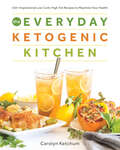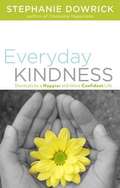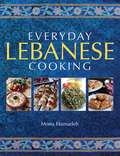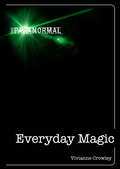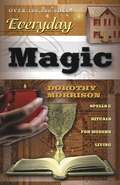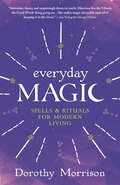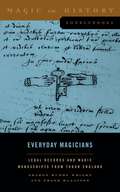- Table View
- List View
Everyday Grace
by Marianne WilliamsonDescription: In this comforting,inspirational companion to the No. 1 New York Times bestseller, A Return to Love, Marianne Williamson returns to her spiritual roots, writing on the art of nurturing a thriving soul in a harsh world. What do your spiritual convictions have to do with traffic jams, job anxiety, reading the newspaper, or arguing with your spouse? Everything, according to Marianne Williamson. It is the way we live in our everyday world that determines the shape of who we are. So Buddhist or Muslim, Christian or Jew, it is the moment when your child fails an exam, when your best friend lands your dream job, or your business instinct tells you to watch your back, that tests and builds our living faith. With an attitude of hope, a call to forgive, a celebration of miracles, and the promise of strength and grace, Williamson helps us find our sacred footing on ordinary ground. No matter where we are or what we're doing, no matter what difficulties we face, there is always an opportunity to be happy, to connect with the spiritual - and to open our hearts and our minds. In the book of hours, Marianne Williamson teaches us to ride the currents of life and to seek out the sacred that will bring forth a sea change of the soul.
Everyday Healing: Stand Up, Take Charge, and Get Your Health Back . . . One Day at a Time
by Janette Hillis-JaffeDaily actions and thought exercises to set you on an easier and more effective path towards better health. &“If you read one book on healing, this is it!&”—Marilyn Paul, PhD, bestselling author of An Oasis in Time Almost half of Americans struggle with illness—everything from heart disease, diabetes, and lupus to fibromyalgia, rheumatoid arthritis, cancer, or chronic pain. More than a third of our population is obese. As a nation, we are sick—and getting sicker, but it doesn&’t have to be that way. Janette, who suffered with chronic illness for six years, knows how difficult it can be to get your health back. So instead of prescribing a specific treatment, diet, or exercise routine, Everyday Healing provides daily action steps to help you eliminate old habits and establish new paths to health. It offers practical guidance on overcoming healing challenges—from organizing your kitchen in order to cook healthier meals and boosting your confidence that you can heal, to having a tough conversation with an unsupportive spouse. Readers of Everyday Healing will find: Personal stories and medical studies that demonstrate the power of each daily action step.Tips to effectively research and evaluate new treatment options.Tools to manage tough emotions and create a fabulous support team.Organizing principles to routinize healthy eating, sleeping, and exercise. &“In over fifteen years of medical practice, I&’ve learned that each individual&’s healing process is unique. In that regard, Everyday Healing is a breath of fresh air. Instead of giving you a one-size-fits-all prescription, Janette lovingly provides the tools to find your own path to health and stick to it. It&’s a must-read for anyone seeking real healing.&”—Andrew D. Shiller, MD, founder of Integrative Rehabilitation Medicine
Everyday Healing with Essential Oils: The Ultimate Guide to DIY Aromatherapy and Essential Oil Natural Remedies for Everything from Mood and Hormone Balance to Digestion and Sleep
by Jimm HarrisonEveryday healing solutions are at your fingertips with the expert information in this book and a core stock of essential oils. Aromatherapy has the potential to support immunity, soothe inflammation and digestion, improve sleep, balance hormones, provide all-natural pain relief, and much more. Everyday Healing with Essential Oils helps you:• Get to know the 30 most versatile oils and how to use them to improve your everyday life• Select quality oils and essential supplies you need to begin blending right away • Try more than 200 powerful aromatherapy recipes to boost your health and happiness• Find natural remedies for more than 100 common complaints, organized alphabetically—from acne and anxiety to vertigo and warts• Start an easy, cost-effective essential oil collection that covers so many needs—including an aromatherapy first-aid kitYou’ll soon discover that essential oils are powerful holistic healing tools and keys to a healthy lifestyle.
Everyday Health™ My Calorie Counter: Complete Nutritional Information on More Than 8,000 Popular Brands, Fast-food Chains, and Restaurant Menus
by Maureen Namkoong Jennifer SucovFrom Everyday Health, the #1 health destination on the web, comes a pocket-size guide to nutrition and weight loss. Culled from the sites comprehensive database of nutritional information, this expansive tool makes navigating the wide world of food easy. The book is divided into three categories: regular foods, store brands, and restaurant/fast foods, each with thousands of entries that offer information on calorie count, fat content, and nutritional values - including carbohydrates, cholesterol, sodium, and fiber - all presented in a user-friendly format. Success stories from the Everyday Health community motivate readers to meet their own goals.
Everyday Health Tips: 2000 Practical Hints For Better Health And Happiness
by Debora TkacEveryday Health Tips is all about providing you with the biggest, best, most varied collection of health tips ever gathered in one place. This book is like a health-lover's fantasy of fast food: fun to consume, loaded with things that are good for you and ready right now.
Everyday Healthy Cookbook: Recipes and a Meal Plan to Make Healthy Eating Easy
by Kathy HodsonLay the foundation for good health with 100 healthy, family-friendly recipesHealthy eating isn't a fad diet or a trend—it's a lifestyle that promotes overall well-being. The Everyday Healthy Cookbook is filled with two weeks of meal plans, 100 flavorful recipes, and tons of information to help you eat healthfully, simply, and deliciously every day of the year.These dishes cover every meal of the day, and they're organized by cooking method for your convenience: no-cook, 30-minute, one-pot, big-batch, pressure cooker, and slow cooker. You'll find nutritional information with every recipe in this healthy cookbook, plus labels for vegetarian, vegan, and low-calorie options. Who knew eating healthy could be so easy?The Everyday Healthy Cookbook includes:100 irresistible recipes—Explore simple yet scrumptious recipes like Peanut Butter & Jelly Smoothie, Thai Chicken Lettuce Wraps, Open-Faced Peach & Prosciutto Sandwiches, Steak Buddha Bowl, and beyond.No fad diets here—Learn some basic tenets of eating healthy, from limiting processed foods to planning meals, staying hydrated, and more.Get on track—The two-week meal plan in this healthy cookbook lays out easy options for breakfast, lunch, and dinner, plus make-ahead tips and shopping lists.Make tasty, well-balanced meals a part of your daily routine with The Everyday Healthy Cookbook.
Everyday Healthy Cookbook: 120+ Fresh, Flavorful Recipes for Every Meal
by Dana Jacobi“Absolutely comes through on its promise to help you cook healthy food every day”—as featured on Shape.com and RealSimple.com (Two Classy Chics).Providing recipes for a nourishing diet that includes breakfasts, sides, lean protein and vegetable-forward entrees, grains, and even desserts, Everyday Healthy Cookbook serves as an informative guide to those seeking to change, enhance, or better understand their nutrition—and incorporate healthy eating habits into daily meals. Featuring flavorful twists on recipes like Seared Cauliflower Steaks with Olive-Caper Gremolata and Mustard Dill Turkey Burgers, Everyday Healthy also provides nutritious no-fuss classics such as Loaded Avocado Toast and Coconut Macarons. Without having to invest in cookbooks promoting specific diets, home cooks can create a wide-range of dishes that allows them to take charge of their diet in a way that works for their lifestyle.“This book is so loaded with an abundant variety of healthy and delicious recipes you’ll have a hard time choosing where to start.” —Leite’s Culinaria
Everyday Healthy Indian Cookery: Quick and easy curries for really healthy eating
by Manju MalhiThese recipes can be eaten every day for a healthy and balanced diet and feature classic and original curries, including those with an array of spices, vegetables and superfoods that are rich in anti-oxidants and cooked in a way that retains their specific nutrient value.Rooted in the streets, homes and markets of India, Everyday Healthy Indian Cookery reflects the delicious flavours and aromas of the curries and healing spices that characterise the very best of that country's varied cuisine.You'll find all-time favourites, such as traditional style Tandoori Chicken, Cardamom Lamb Karahi and Vegetable Samosas, as well as some more unusual dishes such as Mahi Ajwaini Fish Tikka, Bengali Style Chana Dal, Tamarind Rice, Lentil Pancakes and Hara Bhara Kebabs.Bring the taste of India to your kitchen with Malhi's straightforward and healthy meals that are quick to prepare and delicious to eat.
Everyday Healthy Indian Cookery: Quick and easy curries for really healthy eating
by Manju MalhiThese recipes can be eaten every day for a healthy and balanced diet and feature classic and original curries, including those with an array of spices, vegetables and superfoods that are rich in anti-oxidants and cooked in a way that retains their specific nutrient value.Rooted in the streets, homes and markets of India, Everyday Healthy Indian Cookery reflects the delicious flavours and aromas of the curries and healing spices that characterise the very best of that country's varied cuisine.You'll find all-time favourites, such as traditional style Tandoori Chicken, Cardamom Lamb Karahi and Vegetable Samosas, as well as some more unusual dishes such as Mahi Ajwaini Fish Tikka, Bengali Style Chana Dal, Tamarind Rice, Lentil Pancakes and Hara Bhara Kebabs.Bring the taste of India to your kitchen with Malhi's straightforward and healthy meals that are quick to prepare and delicious to eat.
The Everyday Heart-Healthy Cookbook: 75 Gluten-Free, Dairy-Free, Clean Food Recipes
by Breeana Pooler75 deliciously healthier recipes for any day of the week! At the age of 26, Breeana's husband was suddenly and unexpectedly diagnosed with severe heart failure. Following his diagnosis, she set out to regain his health—which she succeeded in doing by completely revamping their diets. In these pages is the story of how Breanna cured her husband, and seventy-five of the clean and delicious, gluten- and dairy-free recipes that helped her do so. Recipes include: Sweet Potato Breakfast SlidersBBQ Chicken Zucchini Noodle BowlMango-Mint Salsa with Cucumber ChipsHoney Cornbread with JalapenosRoasted Red Pepper and Garlic Hummus DipShrimp and Kale Fettucine in a Cauliflower Cream SauceSloppy Joe Stuffed Baked Potatoes The first step was to throw out everything in the refrigerator, go grocery shopping, and dedicate one hundred percent of her time, energy, and passion. She wanted to create healthy, nutrient-filled recipes to heal her husband&’s heart, but would also taste gourmet and savory. Flash forward one year and her husband not only no longer needs a heart transplant, but also is healthier than he has been in his entire life, and his heart is within normal range—the results are tried and true! Food had truly saved his life.
Everyday Herbal Teamaking: A Pocket Guide for Health, Fun, and Self-Care
by Glenna A. McLeanThis unfussy, spirited guide to 35 readily accessible herbs offers botanical names, medical reputations from various modern and historical sources, good-humoredly honest tasting notes, and illustrations to help identify what you've just foraged, grown, or bought at the herb shop or health food store. With teacher and tea aficionado Glenna McLean as your guide, travel back in time by enjoying a blend of herbs that King Tut savored, a tea that was thought to ward off the Plague in the 14th Century, and the herbs imbibed by druids at Stonehenge and Puritan church services. Quaff brews purported to bring you courage, quench (or ignite) lust, ward off scurvy, and soothe stress and pain. Includes warnings and contraindications so you can pursue your herbal tea habit safely and happily for years to come.
The Everyday High Protein Handbook: THE BRAND NEW COOKBOOK - with 80 delicious family-friendly recipes
by Scott BaptieTHE BRAND NEW COOKBOOK FROM SCOTT BAPTIE ---Scott Baptie is back with 80 new, delicious family-friendly high protein meals that will leave you feeling full.Featuring 60 delicious new recipes using simple, unprocessed ingredients, alongside 20 of Scott's most popular meals from his blog, split into four convenient sections: POULTRY / VEG / BEEF AND LAMB / FISH and SNACKS & DESSERTS. Each recipe has key nutritional information as well as a handy barcode to scan straight to your food diary.NEW Recipes include:- Pimm's & Lemonade Chicken- Slow Cooker Beef Rendang- Trinidadian Chicken Curry- Cuban Pulled Beef- Greek Lentil Soup- Chilli Prawn, Chicken and Egg Fried rice- Chicken Katsu CurrySuper easy to make, this is real, proper food with all the flavour - Scott has helped thousands of people eat better every day - join his high protein revolution.
The Everyday High Protein Handbook: THE BRAND NEW COOKBOOK - with 80 delicious family-friendly recipes
by Scott BaptieTHE NEW MUST-HAVE HIGH PROTEIN COOKBOOK FROM SCOTT BAPTIE ---Scott Baptie is back and he is bringing the flavour with 80 mouth-watering, protein-packed recipes designed to keep you full and satisfied. Perfect for busy families and health-conscious foodies alike, this cookbook is a treasure trove of simple, healthy ingredients transformed into culinary delightsWith 60 brand-new creations and 20 fan-favourites from Scott's popular YouTube channel, you'll find everything you need to elevate your cooking game. The recipes are thoughtfully divided into four sections-Poultry, Veg, Beef & Lamb, Fish, and Snacks & Desserts-making meal planning a breeze.NEW Recipes you'll love:- Pimm's & Lemonade Chicken- Slow Cooker Beef Rendang- Trinidadian Chicken Curry- Cuban Pulled Beef- Greek Lentil Soup- Chilli Prawn, Chicken and Egg Fried rice- Chicken Katsu CurryEach recipe comes with essential nutritional info and a handy barcode to seamlessly add to your food diary. These dishes are not just easy to make-they're bursting with flavour and nutrition.Join thousands of others who have transformed their meals with Scott's guidance. Whether you're looking to boost your protein intake or simply want to cook delicious, wholesome food, this cookbook is your go-to guide.Get ready to embrace a new way of eating-real food, real flavour, real results.
Everyday Hope: 365 Ways to a Tranquil Life (365 Ways to Everyday...)
by Everyday HopeEveryone has goals and dreams, or decisions and dilemmas they need a bit of hope for. With a tip, exercise or inspirational quote for each day of the year, Everyday Hope is the little book that will encourage to you open up, dare to dream and find your way to a more positive and hopeful life.About the Everyday series Get to grips with a single subject in small, manageable steps with the Everyday series. From inspirational quotes to professional tips, the short daily entries fit perfectly into the hustle and bustle of everyday life.
Everyday Intuition: What Psychology, Science, and Psychics Can Teach Us About Finding and Trusting Our Inner Voice
by Elizabeth GreenwoodA captivating and insightful deep dive into the world of human intuition, exploring the power of this elusive phenomenon and how it can be harnessed to better know and trust ourselves. We rely on our intuition, even though we don’t fully understand what it is, how it works, or if we can even trust it. In this fresh, mind-opening book, Elizabeth Greenwood takes us on a sweeping investigation into the subject, exploring how, in our data-driven world, we can harness intuition in our day-to-day lives.Digging deep into her personal experience as well as insights from neuroscience, psychology, , feminist texts, psychics, and everyday people with extraordinary intuitive ability, Greenwood explores what we know about intuition—how to distinguish it from instinct, wishful thinking, anxiety, and denial; how it serves and sometimes fails us; how it impacts our dreams and unconscious behavior; and how it manifests in everything from romantic attraction to premonitions. Greenwood places a special emphasis on “women’s intuition,” and how it has been denigrated throughout history—but can offer us a more hopeful, grounded way of experiencing the world in a time of so much uncertainty.Everyday Intuition provides practical advice on tapping into our self-knowledge and learning to trust our instincts. It examines the science behind intuition, including how our brains process information, how psychedelic medicine and manifestation are opening new doors of consciousness—as well as how these helpful methods are being abused by charlatans, including some "coaches," "teachers," and social media influencers offering false promises—and how we can train ourselves to be more intuitive and ultimately enhance our daily lives.Smart, funny, sincere, and profound, this helpful guide is a modern take on one of the oldest tools we possess. It shows us how embracing intuition can lead us to our truest, most mindful selves, and to better align the lives we are living with the lives we desire.
Everyday Karma: A Psychologist and Renowned Metaphysical Intuitive Shows You How to Change Your Life by Changing Your Karma
by Carmen Harra“Wouldn’t it be heavenly to erase the mistakes of the past, eliminate confusion in your daily life, and feel safe about what tomorrow brings? In Everyday Karma I show you exactly how to do that. I demonstrate how day-to-day thoughts and actions can plant karmic seeds in your life that will either blossom like flowers or take over like weeds. This book will guide you into a deep understanding of your own karma and give you the tools to heal the past and discover a more joyful future.”–CARMEN HARRAThe author of Everyday Karma is one of the great psychics of our time, a veritable “karmic counselor” whose gifts have enabled her to help presidents, first ladies, Wall Street executives, royalty, and Hollywood celebrities achieve their true destinies. She predicted the collapse of the Soviet Union, John Kennedy Jr.’s death, President Clinton’s impeachment, and major karmic events around the world with better than 90 percent accuracy.Now, in Everyday Karma, she invites you to embark upon a journey of healing and enlightenment–and to start living the life that is yours alone. Through her own spiritual biography (beginning with a near-death experience when she was young), true stories from many of her clients, and her predictions of coming events, you’ll be inspired to initiate your own spiritual evolution. With powerful, specially created meditations, prayers, and visualizations, she helps you resolve your specific problems, even deeply ingrained and self-destructive ways of thinking and behaving.Unique among books about spiritual growth and healing, Everyday Karma emphasizes the great power of the karmic energy within you that is waiting to be tapped–and tells you exactly how to set it free, including how to Enter the invisible world of spirit and light Hear messages from your spirit guide Create karmic relationships Heal karmic wounds and improve your emotional and physical health Discover your karmic life purpose Bring fresh, positive, and balanced energy into your everyday worldMost of us live our entire lives with, at best, a vague sense of dissatisfaction that even great fame and wealth seem unable to dispel. This book shows you another way. The lessons that Carmen Harra learned from the invisible world and shares with you here will light your path to a transformed and deeply fulfilled life in the visible world, starting here and now.From the Hardcover edition.
Everyday Karma: How to Change Your Life by Changing Your Karma
by Carmen HarraWouldn't it be heavenly to erase the mistakes of the past, eliminate confusion in your daily life, and feel safe about what tomorrow brings? I show you exactly how to do that. I demonstrate how day-to-day thoughts and actions can plant karmic seeds in your life that will either blossom like flowers or take over like weeds. This book will guide you into a deep understanding of your own karma and give you the tools to heal the past and discover a more joyful future.-CARMEN HARRA. The author of Everyday Karma is one of the great psychics of our time, a veritable "karmic counselor" whose gifts have enabled her to help presidents, first ladies, Wall Street executives, royalty, and Hollywood celebrities achieve their true destinies. She predicted the collapse of the Soviet Union, John Kennedy Jr. 's death, President Clinton's impeachment, and major karmic events around the world with better than 90 percent accuracy. Now, in Everyday Karma, she invites you to embark upon a journey of healing and enlightenment--and to start living the life that is yours alone. Through her own spiritual biography (beginning with a near-death experience when she was young), true stories from many of her clients, and her predictions of coming events, you'll be inspired to initiate your own spiritual evolution. With powerful, specially created meditations, prayers, and visualizations, she helps you resolve your specific problems, even deeply ingrained and self-destructive ways of thinking and behaving. Unique among books about spiritual growth and healing, Everyday Karma emphasizes the great power of the karmic energy within you that is waiting to be tapped--and tells you exactly how to set it free, including how to: Enter the invisible world of spirit and light; Hear messages from your spirit guide; Create karmic relationships; Heal karmic wounds and improve your emotional and physical health; Discover your karmic life purpose; Bring fresh, positive, and balanced energy into your everyday world. Most of us live our entire lives with, at best, a vague sense of dissatisfaction that even great fame and wealth seem unable to dispel. This book shows you another way. The lessons that Carmen Harra learned from the invisible world and shares with you here will light your path to a transformed and deeply fulfilled life in the visible world, starting here and now.
Everyday Ketogenic Kitchen: With More Than 150 Inspirational Low-carb, High-fat Recipes To Maximize Your Health
by Carolyn KetchumStep into the kitchen of renowned food blogger and low-carb guru Carolyn Ketchum as she shows you how to create mouthwatering keto dishes in her new cookbook, The Everyday Ketogenic Kitchen. She delivers a delectable array of recipes from easy family favorites to more gourmet, “date night” fare. Each recipe is made from fresh, accessible, whole-food ingredients and is free of grains, gluten, and sugar. From breakfast to dessert and everything in between, these recipes will inspire readers to get into the kitchen and enjoy cooking, every day. With more and more people turning to the ketogenic diet to regain health, lose weight, or simply feel their best, low-carb, high-fat diets have established their place in the mainstream and have become an everyday way of life. With the diet’s rising popularity comes a greater demand for recipes that entice the palate, excite the senses, and deliver satisfaction without starvation. The Everyday Ketogenic Kitchen answers that demand and shows people how to go beyond eggs, meat, and cheese and love the way they eat! The Everyday Ketogenic Kitchen will enable readers to break free from the constraints of modern dieting and put them on a path to lifelong heath with a keto-adapted lifestyle. Ketchum teaches how to create keto-friendly recipes that taste just as good, if not better than, their unhealthy counterparts. Her recipes allow people to enjoy the taste, freedom, and sustainability of the keto way—without the restriction of typical fad diets. The Everyday Ketogenic Kitchen includes 150 step-by-step recipes with full-color photos, a simple guide to getting started, tips and tricks on mastering keto cooking and baking, shopping lists, and much more! Sample recipes include: • Cream Cheese Waffles • Red Wine Braised Short Ribs • Sautéed Green Beans with Crispy Prosciutto • Slow Cooker Broccoli Cheese Soup • Brown Butter Ice Cream • Easy Peanut Butter Cups For aspiring home cooks, kitchen warriors, and anyone else looking for new and delicious low-carb dishes, The Everyday Ketogenic Kitchen is a must-have!
Everyday Kindness: Shortcuts to a Happier and More Confident Life
by Stephanie DowrickThe internationally renowned author of Choosing Happiness shows how a little bit of everyday kindness can help us tackle the pressures of the modern world--providing the insights, reassurance, and the means to worry far less and enjoy life more. Change your life with Everyday Kindness. Virtually every moment of our greatest well-being reflects the giving and receiving of kindness. At home, work, and in the wider world, there are countless opportunities when a moment of consideration or kindness--given or received--will transform your day. Whether it is a hard time to be endured or a wonderful time to be shared and celebrated, it's our willingness to think well of ourselves and act kindly toward others that makes all the difference. In this intimate, deeply encouraging book, author Stephanie Dowrick takes kindness as her inspiration and theme and shows us how to bring the practice of kindness into our daily lives. This simple act, Dowrick illustrates, is vital in helping us grow in self-confidence and appreciation, make the best choices to support our physical and emotional well-being, find pleasure in our work and in our relationships, and experience more authentic love. Everyday Kindness provides the reader with the spiritual and psychological tools to make a calmer, happier, and more rewarding life immediately possible.
Everyday Lebanese Cooking
by Mona HamadehUsing only fresh produce and a balanced mix of fresh vegetables, fresh fruit, herbs, fish, poultry and occasionally meat, Lebanese food has the reputation of being amongst the healthiest in the world.This book includes a wide variety of dishes from Lebanese cuisine, including the well known and delicious Hummus, Baba Ghanouj and Tabouleh through to the most authentic and traditional recipes from the rural mountains and bustling cities along the Mediterranean coast. An emphasis on vegetables and pulses means that many recipes are vegetarian friendly as well as being simple, healthy and affordable. You will discover how to turn a few ingredients into a very tasty meal.
Everyday Magic: Discover Your Natural Powers Of Intuition (The Paranormal)
by Vivianne CrowleyVivianne Crowley presents an accessible introduction to magic in the modern world, exploring how you can integrate magic into your everyday life. Vivianne shows that contemporary self-help methods are rooted in magical practices. She explans how magic can can help us discover and unfold our potential selves, how we can use magic as a force for good, to heal and to remove fears.Vivianne dispels modern myths of magic as wizards, dragons or evil sorcerers and explores ways that magic can be applied in the 21st century, to help us to become more self-aware and empowered in our everyday lives.The Paranormal, the new ebook series from F&W Media International Ltd, resurrecting rare titles, classic publications and out-of-print texts, as well as new ebook titles on the supernatural - other-worldly books for the digital age. The series includes a range of paranormal subjects from angels, fairies and UFOs to near-death experiences, vampires, ghosts and witchcraft.
Everyday Magic: Spells and Rituals for Modern Living
by Dorothy MorrisonLIVE A MAGICALLY MODERN LIFE. Are you tired of looking for ritual solutions for today's problems- computer viruses, traffic that drives you crazy, and stress that makes you forget your own name? Does the quest for obscure spell ingredients leave you exhausted and empty-handed? Now there's a better way to incorporate magic into your life without adding more stress to it! Everyday Magic is bursting with ways to make the Ancient Arts fit today's fast-paced lifestyle. Turn modern conveniences such as coffee makers, blenders and crock pots into viable magical tools. Discover items and forces that boost magical work. Try a large assortment of recipes-with easy-to-find ingredients-for creating your own oils, incenses, potions, and powders. Plus, find over 300 spell and ritual solutions to your toughest challenges: addiction, childbirth, computers, depression, divorce, enemies,gambling, health, hunger, inspiration, legal matters, lost items, parking places, sleep, traffic, victory, weather, and much more! You'll discover new ways to keep the old ways alive with this inspiring guide to living a magically modern life.
Everyday Magic: Spells & Rituals for Modern Living
by Dorothy MorrisonLooking for simple solutions for today's problems: computer viruses, traffic that drives you crazy, and an overextended schedule?There's an easy way to incorporate magic into your life without adding more stress to it. Everyday Magic updates the ancient arts to fit your busy lifestyle. It promotes the use of modern convenience items as viable magical tools, and it incorporates the use of easy-to-find spell ingredients—most of which are already in your kitchen cabinet. It discusses the items and forces that boost magical work, as well as offering a multitude of time-saving tips and a large assortment of recipes for creating your own incenses, potions, and powders. More than 300 spells and rituals cover the everyday concerns of the modern practitioner.Set your spell into motion and speed up the results with "magical boosters"Magnify your focused intent and energy flow with herbs, flowers, trees, and stonesLearn how to perform ancient arts with modern tools: your coffee maker, blender and crock potMake your own magical powders, sachets, bath salts, potpourris, incenses and oilsDiscover the secret to success in magical workingsPractical spells for more than 300 purposes1999 COVR Award Winner
Everyday Magicians: Legal Records and Magic Manuscripts from Tudor England (Magic in History Sourcebooks)
by Sharon Hubbs Wright Frank KlaassenMost of the women and men who practiced magic in Tudor England were not hanged or burned as witches, despite being active members of their communities. These everyday magicians responded to common human problems such as the vagaries of money, love, property, and influence, and they were essential to the smooth functioning of English society. This illuminating book tells their stories through the legal texts in which they are named and the magic books that record their practices.In legal terms, their magic fell into the category of sin or petty crime, the sort that appeared in the lower courts and most often in church courts. Despite their relatively lowly status, scripts for the sorts of magic they practiced were recorded in contemporary manuscripts. Juxtaposing and contextualizing the legal and magic manuscript records creates an unusually rich field to explore the social aspects of magic practice. Expertly constructed for both classroom use and independent study, this book presents in modern English the legal documents and magic texts relevant to ordinary forms of magic practiced in Tudor England. These are accompanied by scholarly introductions with original perspectives on the subjects. Topics covered include: the London cunning man Robert Allen; magic to identify thieves; love magic; magic for hunting, fishing and gambling, and magic for healing and protection.
